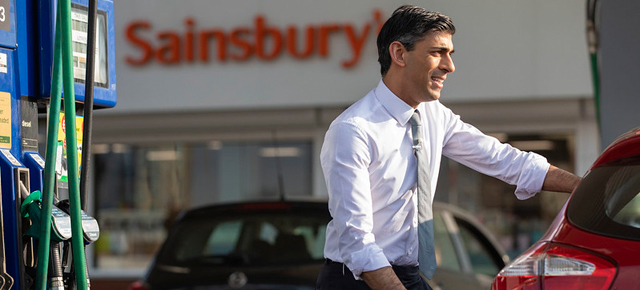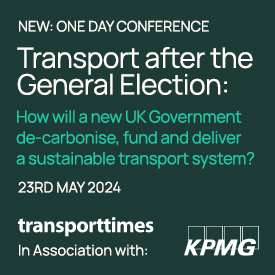The chancellor this week announced the biggest ever reduction in fuel duty to help motorists – but public transport campaigners are not impressed

Chancellor Rishi Sunak was accused of having “pulled the rug from underneath public transport” after announcing a 5p a litre cut in fuel duty in this week’s spring statement.
Campaign for Better Transport has warned that the £5bn a year tax break, which will remain in place until March 2023, will not help those most affected by the cost-of-living crisis and will do nothing to help people switch to more sustainable forms of transport.
“The financial impact of today’s fuel duty cut on people’s pockets will in fact be minimal, whereas the message it sends – that driving is preferable to using public transport – is much more detrimental,” said the charity’s chief executive, Paul Tuohy. “Whilst drivers are given help with the cost-of-living crisis, people that rely on public transport get no help with rising fares and face ongoing cuts to services.”
Since 2012, rail fares have risen at a higher rate than fuel costs, yet rail passengers faced a 3.8% increase in fares this month (4.8% in London), despite calls for a fares freeze. Bus fares have risen at a far higher rate, 54% in the last decade.
The chancellor’s announcement today has pulled the rug out from underneath public transport.
Campaign for Better Transport pointed out that had the cost of fuel for car drivers risen at the same rate as bus fares, it would cost well over 200p a litre by now instead of an average of 167p. People in the lowest-income households make three times as many bus journeys as people with the highest incomes.
Tuohy added: “The Department for Transport has been busy supporting bus and rail travel, but the chancellor’s announcement today has pulled the rug out from underneath public transport.”
COMMENT: Robert Jack
With a cost of living crisis knocking at the door, chancellor Rishi Sunak was under pressure to act – and he did. But did he make the right decision when he cut fuel duty by 5p a litre in this week’s spring statement? The Conservatives binned the fuel duty escalator in 2010 and fuel duty has been frozen since then. Sunak boasted that this was the biggest cut ever, depriving the Treasury of £5bn over 12 months. It will only partially offset the spike in pump prices that followed the outbreak of war in Ukraine, but it will still save you around £3 on the cost of filling up a Ford Focus (and much more if you drive a gas guzzler, of course).
Perhaps Sunak should have looked at New Zealand’s response to rising fuel prices – a reduction in fuel duty alongside half-price public transport
There’s no denying that cutting fuel duty will help a lot of people who are feeling the pinch and depend on their cars. But it will also help a lot of people who don’t need it, and it won’t do much for 35% of the lowest income households which have no access to a car. People in the lowest-income households make three times as many bus journeys as people with the highest incomes, yet the cost of using public transport has consistently risen faster than the cost of motoring. Perhaps Sunak should have looked at New Zealand’s response to rising fuel prices – a reduction in fuel duty alongside half-price public transport.
Road user pricing could provide a more intelligent and fairer way of taxing motorists. In the meantime, there is a risk that Sunak’s selective generosity will be perceived as an endorsement of travelling by car at a time when we should be encouraging behaviour change.
This article appears in the latest issue of Passenger Transport.
DON’T MISS OUT – GET YOUR COPY! – click here to subscribe!








